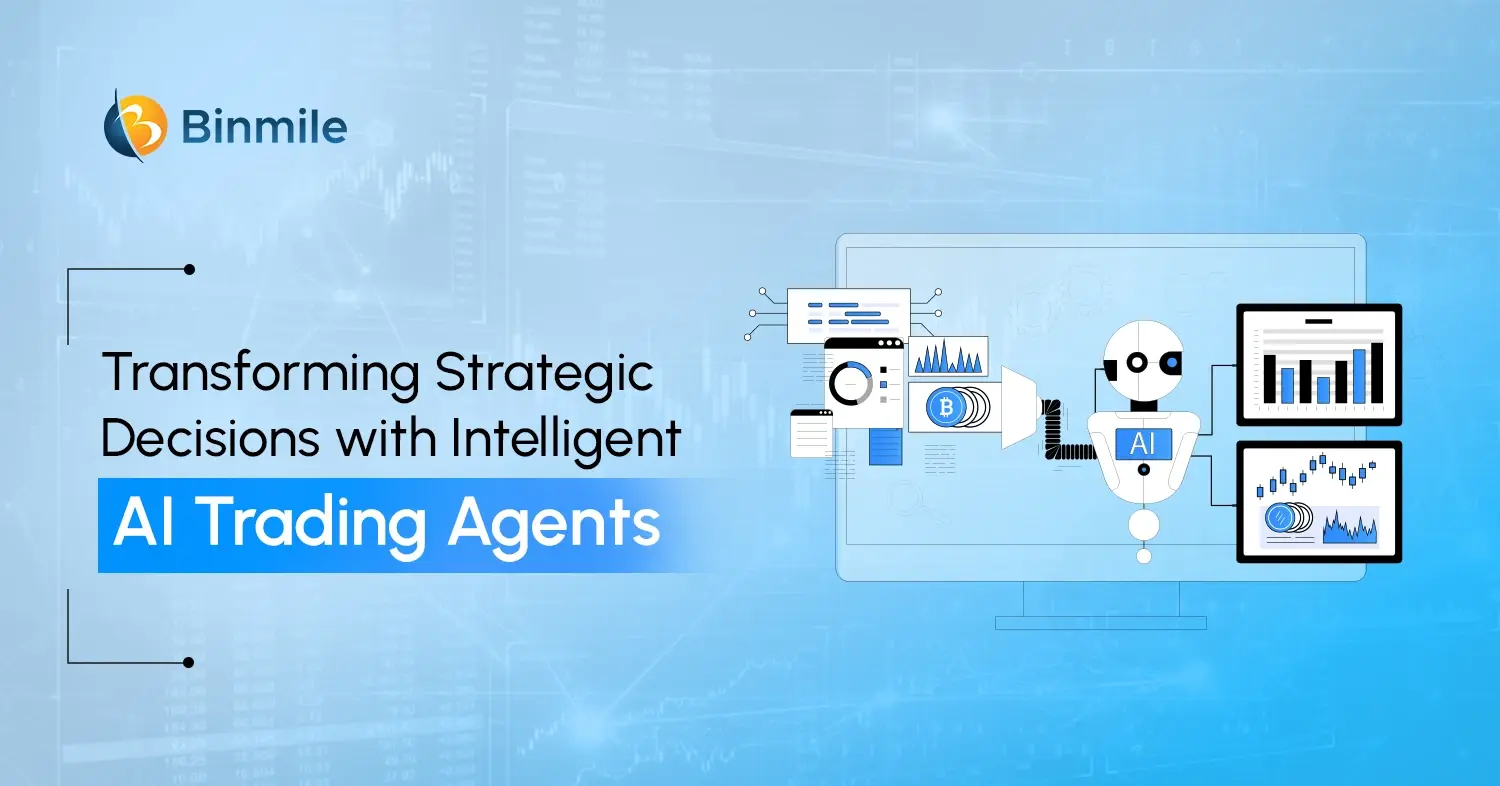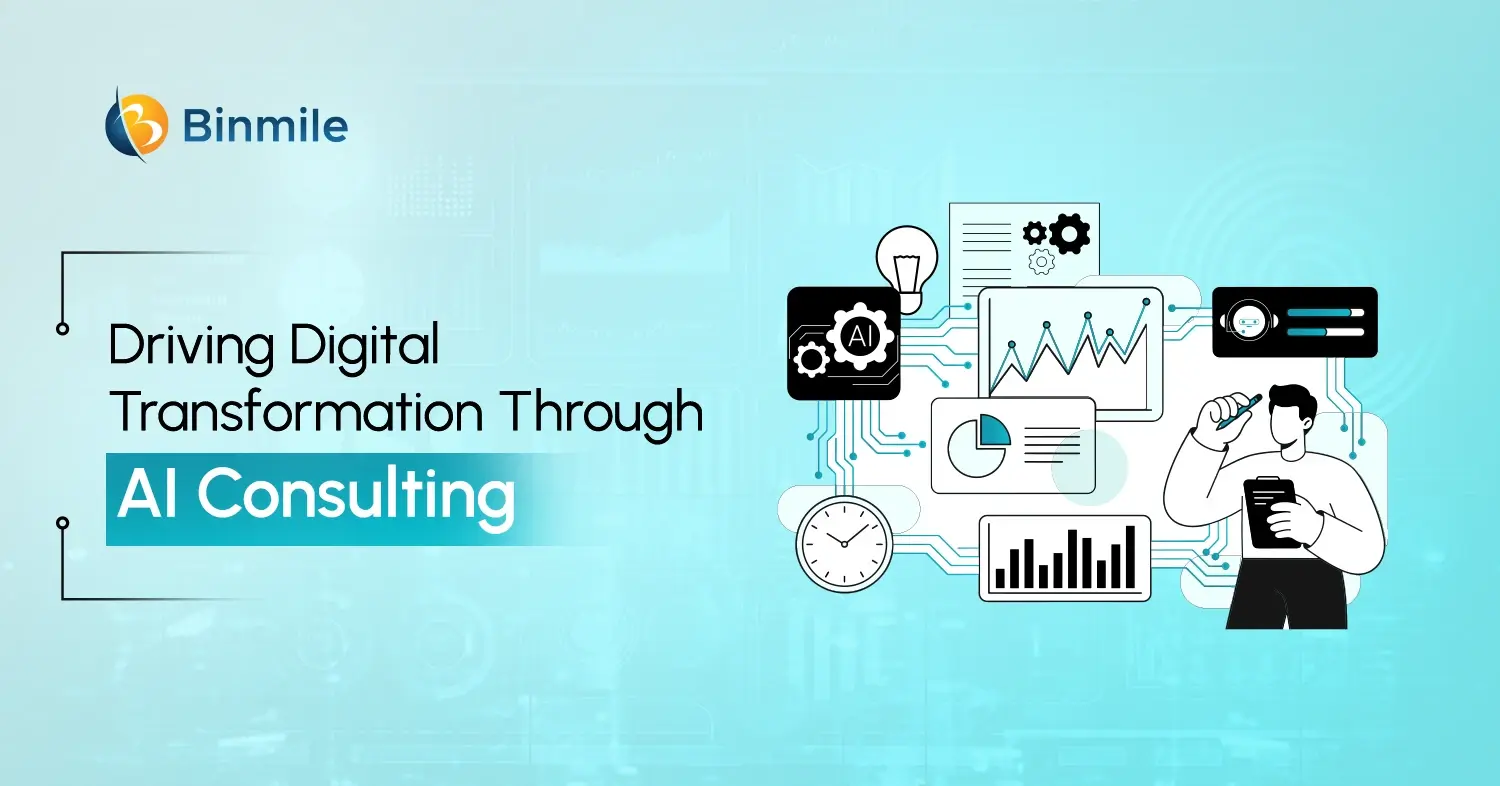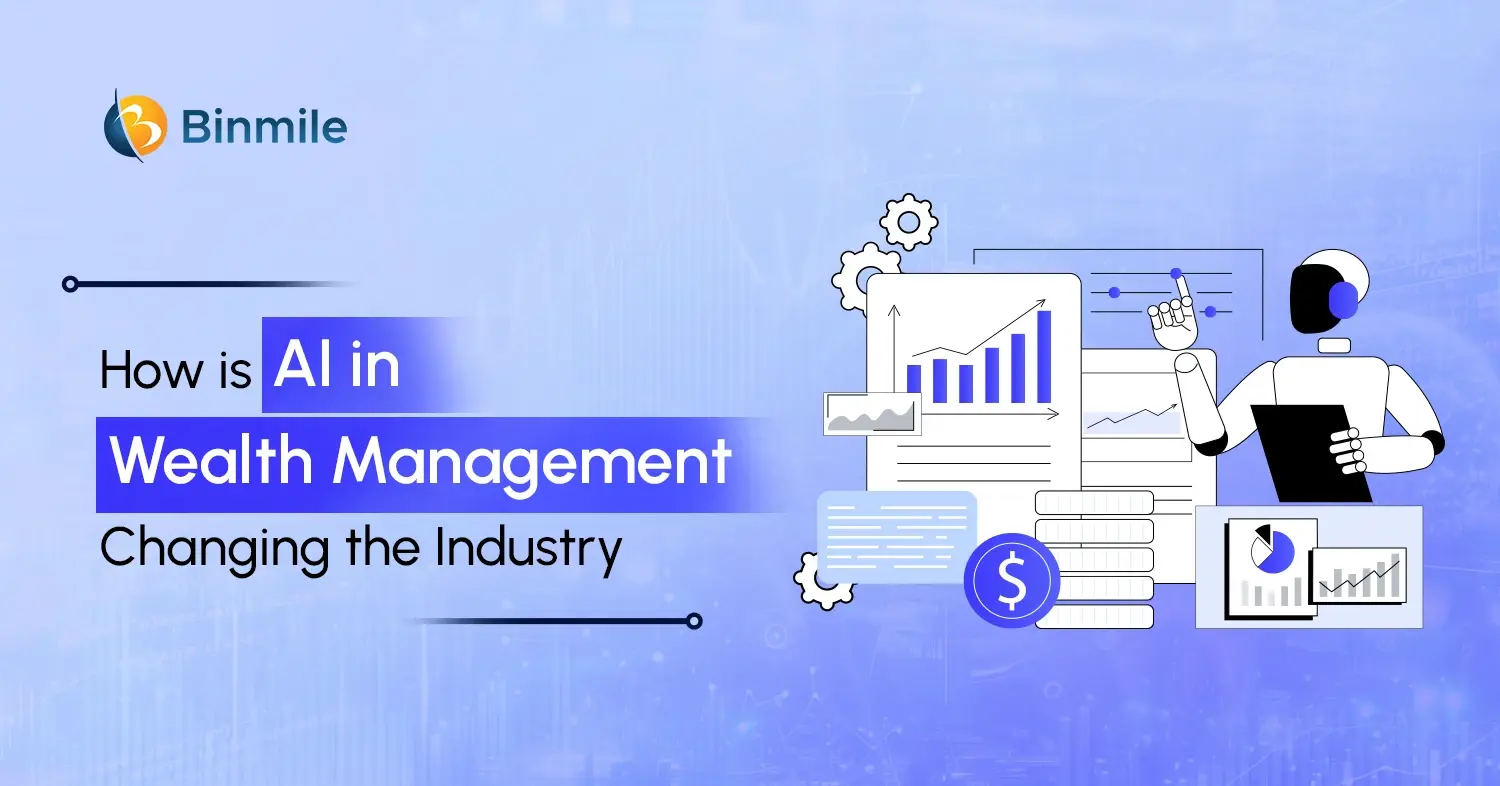Artificial Intelligence is transforming the manufacturing industry with its deep learning capabilities. Many manufacturing businesses are leveraging the maximum potential of artificial intelligence to improve accuracy, efficiency, and productivity across various processes. The manufacturers, who are, adopting AI clearly indicate a strategic move towards modernizing operations and staying ahead of the competition in their industry. In fact, as per a recent survey conducted by a leading tech news covering website, 26% of organizations are actively using AI to enhance their decision-making processes. Now the question comes: how can your business leverage AI in manufacturing to improve decision-making, upsurge efficiency and enter an era of smart manufacturing anytime soon? Well, we will discuss that and more in this content including some use cases and examples of utilizing artificial intelligence in the manufacturing sector. Let’s start:
Introduction to AI in Manufacturing

AI in manufacturing functions within information technology (IT) and operational technology (OT) environments, using AI-powered tools based on machine learning and deep learning to enhance industrial workflows and production. Artificial Intelligence helps improve various aspects of manufacturing, ranging from day-to-day operations to influencing new product development (NPD), expediting time to market, and developing competitive advantages.
With the advent of IoT, edge and cloud networks, and technologies such as machine learning, manufacturers not only have access to more data than before, but they can also take more meaningful actions using captured data, such as:
- Equipment Maintenance
- Supply Chain Monitoring
- Production Process Optimization
- Quicker Product Creation
- Accelerated New Product Development
Top 7 Ways AI in Manufacturing is Revolutionizing Industrial Production
The incorporation of AI in manufacturing is driving a significant shift, pushing the industry towards excellent advancements and efficiencies. Below you can take a look at 7 key use cases in manufacturing with real-world examples.

1. Supply Chain Management
Supply chain management plays a key role in the manufacturing industry and artificial intelligence has cropped up as the biggest contributor to this field. By taking combined advantage of AI and manufacturing, businesses are transforming their supply chain processes and accomplishing notable improvements in accuracy, efficiency, and cost-effectiveness.
Using AI in the supply chain allows leveraging predictive analytics, enhancing inventory management, improving demand forecasting, and streamlining logistics. ML algorithms can analyze historical data, identify patterns, and precisely forecast demand fluctuations. One of the AI in manufacturing examples we can discuss here is that an automotive parts manufacturer can make the most of ML models to estimate demand for spare parts, enabling them to optimize inventory levels and lower costs.
A globally-known retail giant Walmart hugely exploits artificial intelligence in supply chain management to ramp up productivity and customer satisfaction. This retail chain heavily relies on machine learning algorithms to anticipate customer demand, assess past sales data, and handle inventory levels.
2. Warehouse Management
Innovations in AI are also reshaping the warehouse management sector of manufacturing. The rise of AI-driven manufacturing solutions and machine learning has revolutionized the way warehouses operate, resulting in improved efficiency, preciseness, and cost savings. One of the main AI manufacturing use cases for warehouses is inventory management.
The algorithms based on artificial intelligence for manufacturing can analyze historical sales data, existing stock levels, and market trends to forecast demand patterns precisely. This allows warehouses to enhance their inventory levels, mitigating carrying costs while ensuring product availability. For example, BMW counts on AI-powered automated guided vehicles (AGVs) in their manufacturing warehouses to streamline internal logistics operations.
AI in transportation powers these automated guided vehicles that follow predetermined paths, automating the transfer of supplies and finished products, thus optimizing inventory management and visibility for the company.
3. Cobots
Cobots in manufacturing are also known as collaborative robots that come in handy to boost productivity by partnering with human operators. Such robots are deployed in fulfillment centers to assist in picking and packing. These cobots work simultaneously with human workers, navigating complicated areas and recognizing objects with the help of AI systems.
A case in point here is that Amazon’s cobots utilize ML to accelerate order fulfillment, streamline logistics, and enhance operations. These AI-driven robots can carry out intricate tasks accurately and adaptably. Cobots can take care of complex assembly processes and quality control inspections and smoothly tie-up with human workers. This proactive approach established by a leading manufacturing software development company reduces downtime, decreases maintenance costs, and ensures optimum equipment performance.
4. Assembly Line Optimization
Artificial Intelligence is employed in assembly line optimization to optimize the accuracy, efficiency, and flexibility of production processes. By analyzing previous performance metrics along with real-time sensor data, ML algorithms enhance workflow, drive down downtime, and allow predictive maintenance. To ensure the best possible product quality, AI-powered computer vision systems in manufacturing can discover flaws easily.
By changing production parameters due to variations in demand, intelligent automation reduces waste and enhances resource utilization. The use of AI in manufacturing converts assembly lines into data-powered flexible environments with the help of constant learning and adaptation, ultimately soaring output, and supporting high standards in manufacturing processes.
Volkswagen is one of the most relevant examples of a business using AI in manufacturing industry to improve assembly lines. They enhance the effectiveness and ability of their production operations by leveraging AI-backed solutions. This automotive company analyzes sensor data from the assembly line with the help of ML algorithms to predict maintenance requirements and streamline operations.
5. New Product Development
The fabrication of new products in the manufacturing industry has witnessed a significant revolution with the advent of AI. The integration of GenAI in product development has brought innovative approaches and streamlined processes that are transforming the way organizations develop and introduce new products to the market.
One of the main benefits of AI in manufacturing for new product development is the potential to analyze a huge amount of data swiftly and efficiently. Manufacturers can collect insights from market trends, consumer preferences, and competitor analysis by making the most of ML algorithms. This allows them to make data-driven decisions and create products that gel well with market trends.
An excellent example you can learn here is that semiconductor businesses can uncover component failures, forecast potential issues in new designs, and propose outstanding layouts to improve outcomes in IC design by utilizing the full potential of machine learning in manufacturing.
6. Performance Optimization
Performance optimization is a significant aspect of manufacturing and AI turns out to be useful in that area. Aligning with emerging AI business trends, AI algorithms can find patterns, identify anomalies, and perform data-driven predictions by analyzing historical data, real-time sensor data, and the rest of the relevant variables. This allows manufacturing businesses to improve operations, reduce downtime, and increase overall equipment effectiveness.
General Electric (GE) is one of the artificial intelligence use cases in manufacturing where this technology modifies factory performance optimization. This company has incorporated AI algorithms into its manufacturing processes to analyze a sizeable amount of data from sensors as well as historical records. They can detect trends, foresee possible equipment issues, and streamline processes using AI. By implementing this approach, GE can also minimize equipment downtime, augment overall equipment effectiveness, and enhance manufacturing operations efficiency.
7. Predictive Maintenance
Predictive maintenance has popped up as a fruitful application in the manufacturing industry due to the use of artificial intelligence. By tapping advanced predictive analytics and ML algorithms, AI in manufacturing industry allows organizations to proactively track and estimate equipment failures, reducing downtime and improving maintenance schedules.
One crucial concept in predictive maintenance is the digital twin. A digital twin is a virtual copy of a physical asset that captures real-time data and imitates its behavior in a virtual ecosystem. By linking the digital twin with sensor data from machinery, AI development services for the manufacturing industry can analyze patterns, discover any abnormalities, and forecast possible failures.
One of the finest AI in manufacturing examples is the application of digital twin technology in the automotive company Ford. For every vehicle model it manufactures, Ford develops different digital twins and each twin deals with a different production area, from ideation to development to operation. They also leverage digital models for manufacturing procedures, production facilities, and consumer experiences. The digital twin of their manufacturing facilities can accurately recognize energy losses and highlight places where energy can be saved, and overall production line performance can be tweaked.
Want to leverage the power of AI in manufacturing? Our AI development services can help you optimize processes, boost efficiency, and stay ahead of the competition.

How Can Binmile’s Custom AI Solutions Help You Excel in the Manufacturing Sector?
Now that you have perused the whole content, you must have become familiar with the significant role of AI in transforming various aspects of the manufacturing industry. Right from supply chain management to predictive maintenance, incorporating AI in manufacturing processes has significantly optimized accuracy, efficiency, and cost-effectiveness for various business owners. To experience the maximum impact of artificial intelligence in manufacturing, you will need to hire software developer having expertise in AI development services. Binmile’s specialization in developing state-of-the-art AI and ML products especially customized for manufacturing businesses has positioned the company as a leader in the IT industry. And if you want to avail AI-driven services of the topmost manufacturing software development firm, please get in touch with their service executives immediately.









